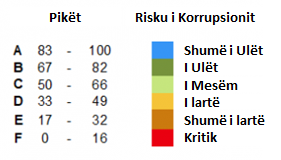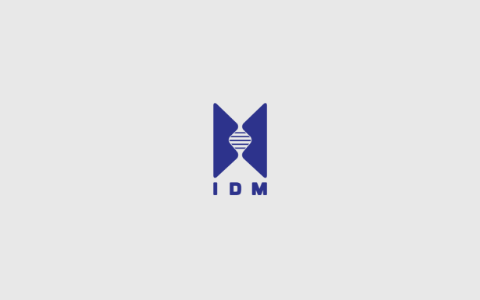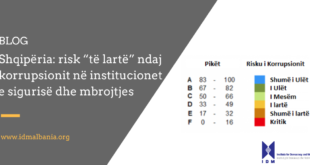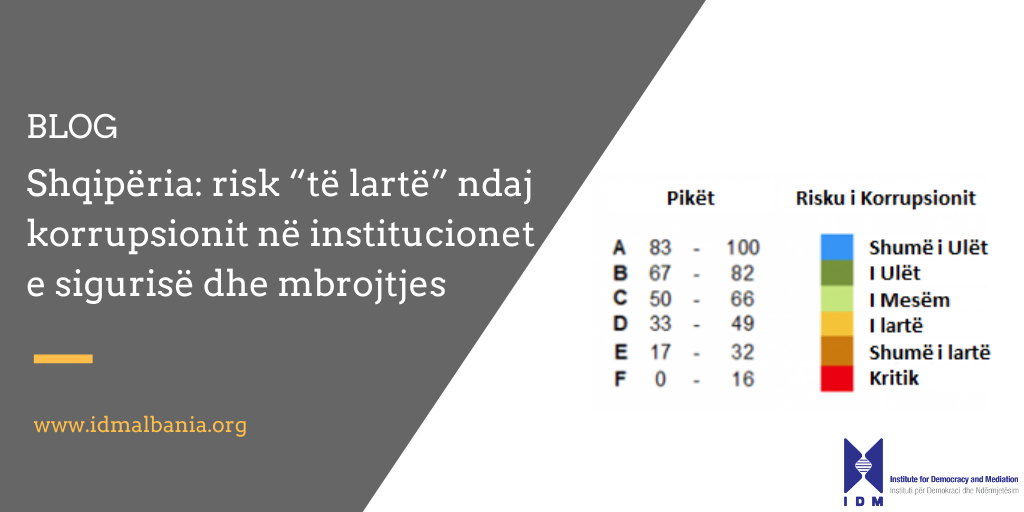Shqipëria: risk “të lartë” ndaj korrupsionit në institucionet e sigurisë dhe mbrojtjes
Autori: Redion Qirjazi
Dhjetor 2020 – Në ditën ndërkombëtare kundër korrupsionit, më 9 Dhjetor 2020, organizata ndërkombëtare Transparency International, publikoi raportin e saj të Indeksit Qeveritar mbi Integritetin e Mbrojtjes së për vendet e Evropës Qendrore dhe Lindore, në të cilat është përfshirë edhe Shqipëria.
Raporti analizon risqet që u kanosen shteteve të ndryshme ndaj korrupsionit në sektorin e mbrojtjes, mat efektshmërinë e qeverisjes në këtë sektor, dhe ofron udhëzime praktike për të reduktuar mundësitë e korrupsionit dhe përmirësuar qeverisjen në sektorin e mbrojtjes. Ai vlerëson risqet ndaj integritetit në sektorin e mbrojtjes sigurisë sipas 5 kategorive të riskut: politik, financiar, personeli, operacional, dhe prokurimet.
Indeksi Qeveritar mbi Integritetin e Mbrojtjes përdor një metodologji të konsoliduar të përberë nga 77 pyetje të ndara në nënkategori, duke ofruar një total prej mbi 200 indikatorësh të dhënash për secilin nga vendet e shqyrtuara. Në vijim Indeksi vlerëson riskun ndaj korrupsionit për secilin vend në 6 kategori të përgjithshme nga “shumë i ulët” në “kritik”.
 Studimi mbulon periudhën 2018-2019 dhe vjen në një kohë kur kriza ekonomike, politike dhe shoqërore në Shqipëri (fatkeqësitë natyrore, unipolariteti politik, COVID-19 dhe kriza ekonomike shoqëruese) e kanë zhvendosur vëmendjen larg këtij sektori, ndonëse shumë i rëndësishëm për politikën ekonomike, të sigurisë dhe atë të jashtme të vendit. Problematika e evidentuar në raport thekson nevojën për të mos e lënë “në hije” këtë sektor të rëndësishëm dhe për t’u ri-angazhuar me nevojat e tij me qëllim zbutjen e riskut ndaj korrupsionit dhe praktikave të këqija të qeverisjes.
Studimi mbulon periudhën 2018-2019 dhe vjen në një kohë kur kriza ekonomike, politike dhe shoqërore në Shqipëri (fatkeqësitë natyrore, unipolariteti politik, COVID-19 dhe kriza ekonomike shoqëruese) e kanë zhvendosur vëmendjen larg këtij sektori, ndonëse shumë i rëndësishëm për politikën ekonomike, të sigurisë dhe atë të jashtme të vendit. Problematika e evidentuar në raport thekson nevojën për të mos e lënë “në hije” këtë sektor të rëndësishëm dhe për t’u ri-angazhuar me nevojat e tij me qëllim zbutjen e riskut ndaj korrupsionit dhe praktikave të këqija të qeverisjes.
Shqipëria shfaq risk “të mesëm” ndaj korrupsionit në kategorinë e personelit, dhe risk “kritik” në kategorinë e operacioneve. Vlen të përmendet se risku operacional përbën kategorinë më kritike për të gjitha vendet e shqyrtuara në këtë raport. Në rastin e Shqipërisë ky rrisk vjen kryesisht nga mungesa e doktrinave specifike që trajtojnë korrupsionin si çështje me rëndësi strategjike në operacione, si dhe për shkak të mungesës së trajnimeve mbi korrupsionin dhe parandalimin e tij në operacionet ushtarake. Prokurimet dhe financat janë gjithashtu dy kategori që shfaqin nivel “të lartë” risku për Shqipërinë, më së shumti për shkak të transparencës së ulët mbi prokurimet, mbikëqyrjes parlamentare jo të qëndrueshme dhe efektive, si dhe tendencës për të mbi-klasifikuar informacion.
***
Raporti tekstual “Progres i [Ç]Bërë: Qeverisja në Sektorin e Mbrojtjes në Evropën Qendrore dhe Lindore”, identifikon 5 problematika kryesore që kanë nevojë për adresim me qëllim zvogëlimin e riskut ndaj korrupsionit: (1) mbikëqyrja parlamentare, (2) prokurimet e mbrojtjes, (3) transparenca dhe aksesi në informacion, (4) sinjalizimet, dhe (5) operacionet ushtarake (fq. 1).
Sa i përket mbikëqyrjes parlamentare, vihet re se legjislacioni, ndonëse i plotë, nuk ka zbatueshmërinë e nevojshme. Si rrjedhojë, komisioni parlamentar nuk e ushtrojnë siç duhet të drejtën e tij formale si hetime, dëgjesa, pjesëmarrje aktive në vendimmarrje strategjike, përfshirje në shkëmbime të detajuara të informacionit, dhe monitorimi i vazhdueshëm i politikave të mbrojtjes. Në rastin e Shqipërisë, ashtu si dhe në disa vende të tjera të rajonit, vihet re “një tendencë e parlamentit për të përqasur qëndrimet me politikat e ekzekutivit në çështjet e mbrojtjes” aq sa mund të krijohet përshtypja që “stampojnë” (lexo noterizojnë) legjislacion të shtyrë nga ekzekutivi (fq. 8). Sipas raportit, komisioni i Sigurisë Kombëtare ka pak ekspertë të kualifikuar mbi çështjet e mbrojtjes dhe aftësia e tyre për të kërkuar llogari karshi institucioneve është e limituar nga aleancat partiake të tyre (fq. 9).
Raporti shpreh shqetësimin se në kushtet e një menaxhimi të dobët financiar dhe të prokurimeve pa mbikëqyrje të fortë të jashtme, risku i korrupsionit në sektorin e mbrojtjes mund të shumëfishohet, sidomos duke marrë parasysh që vende si Shqipëria janë angazhuar për të përmbushur objektivin e NATOs për të rritur shpenzimet mbi prokurimet në të paktën 20% të buxhetit të mbrojtjes (fq. 13). Konkretisht problematikë për Shqipërinë mbetet fakti se plani i prokurimeve të mbrojtjes duket të mos jetë i bazuar qartazi në Strategjinë Kombëtare të Mbrojtjes gjë që mund të çojë në ndryshime të shpeshta të planit të prokurimeve (fq. 14), dhe se legjislacioni specifik për mbrojtjen mund të përdoret për të përjashtuar prokurimet e mbrojtjes nga ligji për prokurimet publike duke limituar mundësinë për mbikëqyrje efektive (fq. 16). Raporti sugjeron se transparenca dhe llogaridhënia nxisin konkurueshmërinë në sektorin e mbrojtjes, ulin kostot e blerjeve dhe i japin industrisë vendase mundësi më të madhe të zhvillohet në përmbushje të nevojave të sektorit (fq. 16).
Aksesi publik mbi sektorin e mbrojtjes vijon të jetë nën kërcënim në Evropën Qendrore dhe Lindore për shkak të tendencave për të mbi-klasifikuar informacionin institucional (fq. 4). Megjithatë, raporti sugjeron se, ndonëse e drejta publike për informim dhe siguria kombëtare janë parë historikisht si drejtime të kundërta – njëra që advokon për “sekretivitet” dhe tjetra për transparencë – në realitet ato mund të kontribuojnë të dyja në forcimin e sigurisë kombëtare duke lejuar të mbrohet informacioni që është kritik për sigurinë kombëtare, në njërin krah, dhe duke mos lejuar që “perdja” e sekretivitetit të përdoret për të fshehur praktika të këqija, abuzime të pushtetit apo mashtrime, në krahun tjetër (fq. 19). Në Shqipëri, Ministria e Mbrojtjes nuk publikon buxhetin e saj, dhe versioni i nxjerrë nga Ministria e Financave është tepër i përgjithshëm dhe ofron pak vizibilitet dhe justifikim mbi shpenzimet e mbrojtjes (fq. 20). Vendet e Europës Qendrore dhe Lindore ofrojnë gjithashtu një akses të kufizuar në informacion rreth sektorit të mbrojtjes duke abuzuar me rregullat e klasifikimit të informacionit. Sipas Transparency International, mbi-klasifikimi jo vetëm që redukton aksesin publik në informacion, por edhe dobëson aftësinë e institucioneve mbikëqyrëse për të monitoruar sektorin e mbrojtjes (fq. 22).
Së fundmi, raporti paralajmëron dhe për nevojën e përfshirjes së trajnimeve dhe praktikave anti-korrupsion në operacione ushtarake për të mundësuar efektshmëri më të lartë në misione. Aktualisht, strategjitë dhe doktrina e vendeve të Evropës Qendrore dhe Lindore nuk kanë parashikuar mekanizma për parandalimin e risqeve të korrupsionit gjatë operacioneve ushtarake, duke e lënë këtë dimension të aktiviteteve ushtarake shumë të prekshëm ndaj praktikave korruptive.
Raporti i Transparency International është veçanërisht i rëndësishëm për Shqipërinë pasi paralajmëron për problematika të shumta të qeverisjes në sektorin e mbrojtjes edhe 11 vite pas anëtarësimit në NATO, dhe rikujton nevojën për të ri-fokusuar vëmendjen karshi institucioneve të sigurisë dhe mbrojtjes. Indeksi Qeveritar mbi Integritetin e Mbrojtjes vlerëson se Shqipëria paraqet një risk “të lartë” ndaj korrupsionit në këto institucione; kjo falë mekanizmave të dobët të kontrollit dhe riskut si: mbikëqyrje parlamentare jo-efektive, procedura prokurimi “të mjegullta”, reduktim të transparencës dhe llogaridhënës publike përmes abuzimit me klasifikimin e informacionit (mbi-klasifikim), dhe neglizhenca në trajtimin e çështjeve që lidhen me riskun ndaj korrupsionit në strategjitë, doktrinat dhe operacionet ushtarake.






